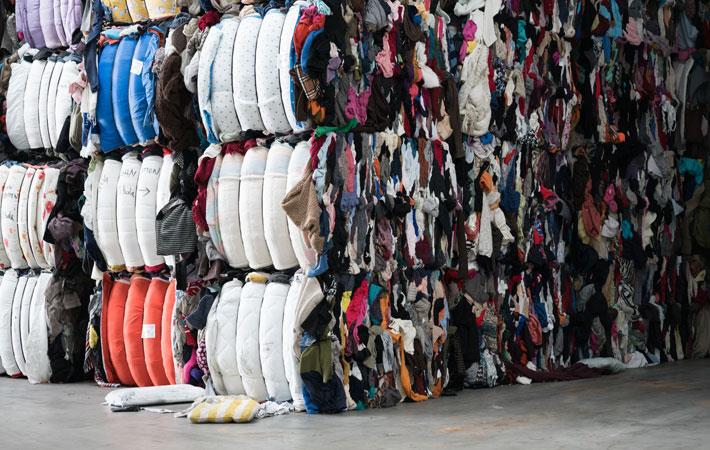Interviews
Textiles recycling industry facing issues: BIR meeting
23 Oct '19
3 min read

Pic: Shutterstock
The textiles recycling industry is facing several issues such as high supply, falling quality, payment concerns, and a need for better recycling solutions. This was stated by Martin Böschen of Switzerland-based Texaid Textilverwertungs in his summary of market reports delivered to the Bureau of International Recycling (BIR) Textiles Division meeting.
The meeting was held on October 14. “We also need to find better recycling solutions for what we can’t reuse,” the division’s president told delegates in Budapest. The meeting was held at the BIR World Recycling Convention (Round-Table Sessions) in Budapest during October 13-15, 2019.
“With a recession on the doorstep, we are not foreseeing any short-term improvement and are expecting a continuing difficult situation for the textiles recycling industry for the next couple of months, which could also lead to financial problems for some market participants,” he said.
Reporting for Italy, Sauro Ballerini warned that low-quality “fast fashion” from China has the potential to offer competition for used clothing in all markets. Meanwhile, there has been steady demand of late on France’s used clothing market as well as consistent export orders, according to Mehdi Zerroug of Framimex.
In anticipation of the European directive calling for totally separate collection of textiles by 2025, Belgian authorities are already pushing the public to put all kinds of textiles into collection containers - even material which goes directly for incineration. “This means that the quality of our originals is going down, and we will have a larger quantity of material for incineration, which will put a big pressure on the margins of the sorting companies,” lamented Pol T’Jollyn of Recutex NV.
Adding a further complexity to current conditions is the uncertainty surrounding Brexit. “If there is no deal (by October 31), reports suggest an estimated 85 per cent of lorries using the main Channel crossings may not be ready for new French customs checks and could face delays of two and a half days,” warned Alan Wheeler of the UK’s Textile Recycling Association (TRA). “More specifically for the waste and resource management sector, I think everyone in the UK should be preparing themselves for much stricter scrutiny of their exports of waste into the EU going forward.”
The UK government is also favouring a proposal that would prevent any of the country’s businesses from taking on foreigners (including EU nationals) for jobs paying less than £30,000 per year, Wheeler added.
Wheeler provided delegates with details of two new initiatives currently at different stages of development in the UK. The first is a partnership between TRA and the National Bed Federation designed to provide commercial advantage to legitimate operators by auditing applicants to join a Register of Approved Mattress Recyclers (RAMR). Three pilot audits have already been completed ahead of the register’s public launch in 2020.
Meanwhile, the Trust, an accreditation scheme, has been launched in September to alleviate concerns about business practices among collectors and sorters. The two-stage application process covers such areas as health and safety, employment law and environmental legislation. “Some charity shops have already said they won’t deal with collectors unless they are accredited,” Wheeler said.
The meeting was held on October 14. “We also need to find better recycling solutions for what we can’t reuse,” the division’s president told delegates in Budapest. The meeting was held at the BIR World Recycling Convention (Round-Table Sessions) in Budapest during October 13-15, 2019.
“With a recession on the doorstep, we are not foreseeing any short-term improvement and are expecting a continuing difficult situation for the textiles recycling industry for the next couple of months, which could also lead to financial problems for some market participants,” he said.
Reporting for Italy, Sauro Ballerini warned that low-quality “fast fashion” from China has the potential to offer competition for used clothing in all markets. Meanwhile, there has been steady demand of late on France’s used clothing market as well as consistent export orders, according to Mehdi Zerroug of Framimex.
In anticipation of the European directive calling for totally separate collection of textiles by 2025, Belgian authorities are already pushing the public to put all kinds of textiles into collection containers - even material which goes directly for incineration. “This means that the quality of our originals is going down, and we will have a larger quantity of material for incineration, which will put a big pressure on the margins of the sorting companies,” lamented Pol T’Jollyn of Recutex NV.
Adding a further complexity to current conditions is the uncertainty surrounding Brexit. “If there is no deal (by October 31), reports suggest an estimated 85 per cent of lorries using the main Channel crossings may not be ready for new French customs checks and could face delays of two and a half days,” warned Alan Wheeler of the UK’s Textile Recycling Association (TRA). “More specifically for the waste and resource management sector, I think everyone in the UK should be preparing themselves for much stricter scrutiny of their exports of waste into the EU going forward.”
The UK government is also favouring a proposal that would prevent any of the country’s businesses from taking on foreigners (including EU nationals) for jobs paying less than £30,000 per year, Wheeler added.
Wheeler provided delegates with details of two new initiatives currently at different stages of development in the UK. The first is a partnership between TRA and the National Bed Federation designed to provide commercial advantage to legitimate operators by auditing applicants to join a Register of Approved Mattress Recyclers (RAMR). Three pilot audits have already been completed ahead of the register’s public launch in 2020.
Meanwhile, the Trust, an accreditation scheme, has been launched in September to alleviate concerns about business practices among collectors and sorters. The two-stage application process covers such areas as health and safety, employment law and environmental legislation. “Some charity shops have already said they won’t deal with collectors unless they are accredited,” Wheeler said.
Fibre2Fashion News Desk (SV)
Popular News
































-Ltd..jpg?tr=w-120,h-60,c-at_max,cm-pad_resize,bg-ffffff)





.jpg?tr=w-120,h-60,c-at_max,cm-pad_resize,bg-ffffff)
.jpg?tr=w-120,h-60,c-at_max,cm-pad_resize,bg-ffffff)






